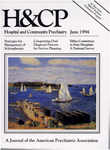Symptom Severity and Utilization of Treatment Resources Among Dually Diagnosed Inpatients
Abstract
Objective: The authors' goal was to determine the clinical characteristics of patients admitted to an acute voluntary psychiatric unit with a dual diagnosis treatment program. Methods: A total of 104 consecutive patients admitted the unit were divided into three groups based on whether they had a current substance use disorder, a past substance use disorder, or no substance use disorder. On the basis of data derived from extensive structured interviews, the three groups' demographic characteristics, severity of symptoms, and utilization of psychiatric and alcohol and drug treatment services were compared. Results: The dually diagnosed patients in the sample were more likely to have a mood disorder, and the patients without a substance use disorder were more likely to have a diagnosis of schizophrenia or mania. Patients with a current substance use disorder had more severe symptoms and used more treatment resources than patients in other groups. Patients with a past substance use disorder also bad increased symptom severity, with measures of severity about halfway between those of patients with current substance use disorder and those of patients with no substance use disorder. Conclusions: Psychiatric patients with a past substance use disorder, like those with a current substance use disorder, may be at risk for increased symptom severity and increased utilization of treatment resources and may need specialized treatment planning. The needs of dually diagnosed patients with mood disorders as well as those with chronic psychotic conditions should be considered in local and national mental health care planning.
Access content
To read the fulltext, please use one of the options below to sign in or purchase access.- Personal login
- Institutional Login
- Sign in via OpenAthens
- Register for access
-
Please login/register if you wish to pair your device and check access availability.
Not a subscriber?
PsychiatryOnline subscription options offer access to the DSM-5 library, books, journals, CME, and patient resources. This all-in-one virtual library provides psychiatrists and mental health professionals with key resources for diagnosis, treatment, research, and professional development.
Need more help? PsychiatryOnline Customer Service may be reached by emailing [email protected] or by calling 800-368-5777 (in the U.S.) or 703-907-7322 (outside the U.S.).



